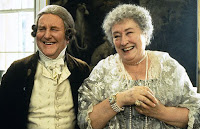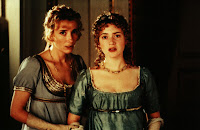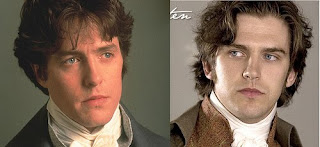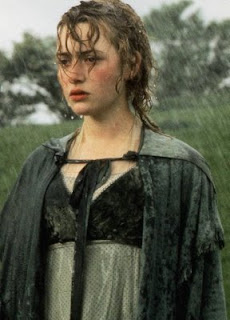22/02/2010
LITTLE AUSTEN WOMEN : CATHERINE AND MARIANNE
30/01/2010
MY JANE AUSTEN BOOK CLUB - THE FIRST MEETING

24/10/2009
EVERYTHING SENSE AND SENSIBILITY
Some reflections on S&S

Jane Austen is usually consider quite a conformist writer: she agrees with the code of good manners and propriety, she accepts social roles and respects rank . But I’m sure she, instead, couldn’t bear so many things of the society she belonged to and she would have protested, if she could, much more openly against all that. What do I mean? For instance, the laws regulating inheritance, which were terribly discriminating toward women. Daughters and wives were victims of social/economic discrimination, they had no rights. Estates were entailed on male heirs, patrimonies were inherited by sons; if a woman, anyhow, owned a patrimony her husband took it over once they got married. Women were forbidden to get a living from a profession: working was considered dishonourable if they were of a good family. I’m sure Jane didn’t easily accept such unequal rules. Can’t you feel her rage beyond her bitter irony?



To close in the right mood for a wonderful Saturday Night and an even more wonderful Sunday, I need a bit of fun and a bit of RA. You can find both in this hilarious clip.
Geraldine Granger, better known as the Vicar of Dibley, is one of S&S greatest fans! She's there just re-watching the movie , when someone incredibly charming and very kind knocks at her door ...
22/04/2009
JANE AUSTEN'S WORLD
 MY AUSTEN ARCHIVE ON LINE
MY AUSTEN ARCHIVE ON LINEAs I've always loved reading Jane Austen's novels since I was a teenager, now I especially love teaching about her, her world and her achievements to my students. This is my on line archive, that is to say, all the posts I've dedicated to her and her production as well as to the several film/drama adaptations from her works I've seen.
If you are among the thousands of Austenettes all over the world and are interested in having a look, here are the links to my professional blog, LEARNONLINE. CLICK ON THE 6 TITLES AND ... FLY HIGH!
1. MISS AUSTEN REGRETS

Based on the life and letters of Jane Austen, Miss Austen Regrets tells the story of the novelist's final years, examining why, despite setting the standard for romantic fiction she died having never married or met her own Mr. Darcy.

Becoming Jane is a 2007 historical film directed by Julian Jarrold. It is inspired by Jane Austen’s (American actress Anne Hathaway) early life, and her posited relationship with Thomas Langlois Lefroy (Scottish actor James McAvoy). Although the film assumes an otherwise unproven relationship between Austen and Lefroy, the original screenplay was inspired by real events, which were chronicled in the book Becoming Jane Austen by Jon Spence, who was the historical consultant on the film. In fact, prior to Spence’s book, biographers Radovici (1995) and Tomalin (2000) have also acknowledged a relationship between Jane Austen and Tom Lefroy.
3. NORTHANGER ABBEY
& THE JANE AUSTEN'S BOOK CLUB

Northanger Abbey was written in 1798, although it was not published until after her death when it was compiled with her final novel, Persuasion. It is notable for being a fierce parody of the late 18th century Gothic style's fainting heroines, 'terror' (giving hints of something fantastic but dreadful, only to quash it later with mundane truth) and haunted medieval buildings. Austen targets with particular venom Ann Radcliffe's extremely popular The Mysteries of Udolpho and has her characters reading and mimicking it whilst the author undermines it at every opportunity. Austen's comparatively thin novel as good as destroyed Radcliffe's reputation for almost two centuries and the exciting gothic writ large of Udolpho is only now being reassessed. Northanger Abbey itself concerns a typical Austen heroine, the young Catherine Morland who is taken to the fashionable resort of Bath with the her friends the Allens. From there she travels to the eponymous medieval abbey, the seat of the Tilneys. As an impressionable girl, Catherine becomes obsessed with the possible atrocities going on at Northanger Abbey, inspired by Radcliffe's novel. As ever, Austen cannot resist injecting a little romance into proceedings and she puts Captain Tilney under the spell of the unpleasant, scheming Isabella Thorpe. The novel's central theme, common to Emma and Sense and Sensibility is the peril of confusion.
 The Jane Austen Book Club is 2007 American romantic drama film written and directed by Robin Swicord. The screenplay, adapted from the 2004 novel of the same name by Karen Joy Fowler, focuses on a book club formed specifically to discuss the six novels written by Jane Austen. As they delve into Austen's literature, the club members find themselves dealing with life experiences that parallel the themes of the books they're reading.
The Jane Austen Book Club is 2007 American romantic drama film written and directed by Robin Swicord. The screenplay, adapted from the 2004 novel of the same name by Karen Joy Fowler, focuses on a book club formed specifically to discuss the six novels written by Jane Austen. As they delve into Austen's literature, the club members find themselves dealing with life experiences that parallel the themes of the books they're reading.
Pride & Prejudice is a 2005 film based on the popular Jane Austen novel of the same name. This second major motion-picture, Academy Award-nominated version was produced by Working Title Films, directed by Joe Wright and based on a screenplay by Deborah Moggach. It was released on September 16, 2005 in the UK and on November 11, 2005 in the US.
 Lost in Austen is a four-part 2008 British television series for the ITV network, written by Guy Andrews and loosely based on Pride and Prejudice by Jane Austen. Produced by Mammoth Screen, the first episode was shown on ITV at 9 pm on 3 September 2008, gaining 4.2 million viewers. The remaining episodes were broadcast on a weekly basis. Lost in Austen was released in the UK on DVD on 28 September 2008.
Lost in Austen is a four-part 2008 British television series for the ITV network, written by Guy Andrews and loosely based on Pride and Prejudice by Jane Austen. Produced by Mammoth Screen, the first episode was shown on ITV at 9 pm on 3 September 2008, gaining 4.2 million viewers. The remaining episodes were broadcast on a weekly basis. Lost in Austen was released in the UK on DVD on 28 September 2008.
6.PRIDE & PREJUDICE 1995 + POWER POINT PRESENTATION "JANE AUSTEN AND THE NOVEL OF MANNERS"
Critically acclaimed and a popular success, Pride and Prejudice was honoured with several awards, including a BAFTA Television Award for Jennifer Ehle for "Best Actress" and an Emmy for "Outstanding Individual Achievement in Costume Design for a Miniseries or a Special". The role of Mr Darcy elevated Colin Firth to stardom. A scene showing Firth in a wet shirt was recognised as "one of the most unforgettable moments in British TV history". The serial inspired author Helen Fielding to write the popular Bridget Jones novels, whose screen adaptations starred Firth as Bridget's love interest Mark Darcy.


.jpg)








